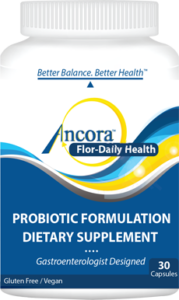GI Health
Better balance leads to better health is the resonating theme in the rational behind Probiotic consumption today. Our gut flora is a complex interaction between “good” and “bad” bacteria and is in a constant state of flux with checks and balances occurring on the microscopic and biochemical level. This intricate system is impacted by a multitude of factors our digestive system encounters on a continuum. Factors from antibiotics ingested to fight illness to antibiotics ingested in the food we eat, to infectious invaders like viruses and bacteria from the outside are dealt with by our immune system and our gut flora is involved every step of the way.
Members of the Scientific community have studied the gut flora and probiotics for decades. The end result is a better understanding of how the gut ecosystem is involved in general health and how the affect of probiotics can have benefits. The science is an evolution and by no means complete however the evidence arising is promising for the role Probiotics play in the promotion of better balance leading to better health.
In October 2013, the International Scientific Association for Probiotics and Prebiotics (ISAPP) organized a meeting of clinical and scientific experts on probiotics (with specialties in gastroenterology, pediatrics, family medicine, gut microbiota, microbiology of probiotic bacteria, microbial genetics, immunology, and food science) to reexamine the concept of probiotics. They define probiotics as “live microorganisms that, when administered in adequate amounts, confer a health benefit on the host.” They also differentiated between products containing probiotics and those containing live or active cultures and established the following criteria:
Live or active cultures criteria:
- Any food with fermentation microbe(s)
- Proof of viability at a minimum level reflective of typical levels seen in fermented foods, suggested to be 1 × 109 CFU per serving
- No specific research or evidence is needed to make this claim.
Probiotics criteria for products that do not make a health claim:
- A member(s) of a safe species, which is supported by sufficient evidence of a general beneficial effect in humans or a safe microbe(s) with a property (for example, a structure, activity, or end product) for which there is sufficient evidence for a general beneficial effect in humans
- Proof of viability at the appropriate level used in supporting human studies
Probiotics criteria for products that make a health claim:
- Defined probiotic strain(s)
- Proof of delivery of viable strain(s) at efficacious dose at the end of shelf life
- Convincing evidence needed for specific strain(s) or strain combination in the specified health indication
Our body normally has what we would call good or helpful bacteria and bad or harmful bacteria. Maintaining the correct balance between these bacteria is necessary for optimal health. Age, genetics, and diet may influence the composition of the bacteria in the body (microbiota). An imbalance is called dysbiosis, and this has possible links to diseases of the intestinal tract, including ulcerative colitis, irritable bowel syndrome, celiac disease, and Crohn’s disease, as well as more systemic diseases such as obesity and type 1 and type 2 diabetes.
The complexity of the gut flora interaction with the immune system is broad. How the immune system and gut flora impact on the development and or inhibition of certain diseases is a focus of the Scientific community. As more knowledge arises from the study of this complex relationship, the role of probiotics may be more crucial than currently believed.

